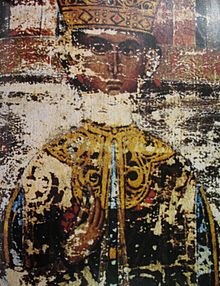Katarina Branković
| Katarina Branković | |
|---|---|

Portrait from Esphigmenou monastery (1429)
|
|
| Coat of arms | |
| Holding(s) | County of Celje |
|
Titles and styles
Countess
|
|
| Born | 1418/19 Vučitrn |
| Died | 1491 Konče |
| Noble family | Branković |
| Spouse(s) | Ulrich II, Count of Celje |
| Father | Đurađ Branković |
| Mother | Irene Kantakouzene |
| Religion | Serbian Orthodox |
Katarina Branković (Serbian Cyrillic: Катарина Бранковић, Greek: Καταρίνα Μπράνκοβιτς; 1418/19–1492), also known as Kantakuzina (Кантакузина, Kantakouzena) was the Countess of Celje, through the marriage with Count of Celje Ulrich II. A Serbian princess, she was the daughter of Despot Đurađ Branković and Byzantine princess Irene Kantakouzene. She is remembered for the Varaždin Apostol (1454), and her endowment of the Rmanj Monastery.
Katarina got married for Ulrich II, Count of Celje (1406—1456) on 20 of April 1434. This was political marriage with intent to ensure western support to Serbian Despotate. Her sister Mara Branković was married to Sultan Murad II to ensure support from the east. Kantakuzina Katarina Branković gave birth to three children, Herman(†1451), George(†1441) and Elisabeth(1441—1455). Pope Pius II once said that Kantakuzina was beautiful and fair (lat. alioquin facie et moribus honestam). In 1453 or 1454 she entrusted creation of Varaždin Apostol, hand-written Orthodox liturgical book and oldest preserved text in Cyrillic from the territory of today's Croatia, to a group of three transcribers.
...
Wikipedia
